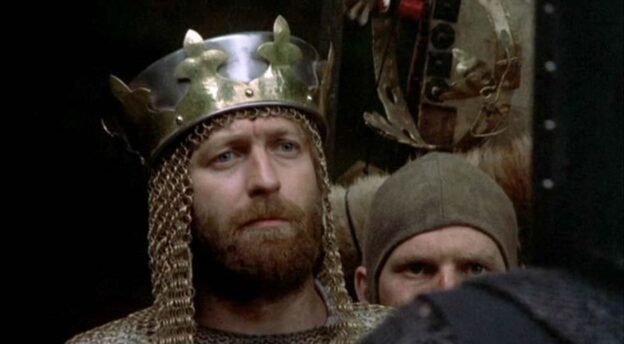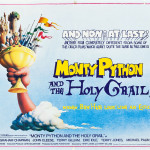Talking to Antony Rotunno about a classic British comedy film which makes fun of the legend of King Arthur (and everything else!) Originally published by Antony on his Film Gold podcast earlier this year.
[DOWNLOAD]
Introduction Transcript
Hello listeners, welcome back to Luke’s English Podcast!
This episode is called Film Club: Monty Python & The Holy Grail (revisited) with Antony Rotunno [LEP / Film Gold SwapCast].
I think the best way to give an introduction to this is just to explain the title. So let me do that.
I will try to keep this short, and I will probably fail.
Film Club
As you may know, from time to time I do these film club episodes in which I talk about films that I love. The idea is that I want to introduce you to films in English which I think are great, and which you might enjoy too and watching films can help with your learning of English as I have discussed before. You can watch these films in English with or without the English subtitles. I recommend doing a bit of both. Sometimes with subtitles, and sometimes without.
The idea is that you can listen to this episode and get to know the film through our comments and descriptions, then watch the film and hopefully understand and appreciate it a bit better, or just listen to this without watching the film at all if you prefer. There are a few audio clips from the film included, for educational purposes of course, so you will be able to hear some moments and scenes.
Some of you will know the film already ← and if that is the case, congratulations – you get bonus points. If you know the film already, hopefully we will still be able to tell you something new about it, because there is a lot to say.
I hope you can get access to the film somehow. There’s always the DVD or BlueRay version if you still have a player, and at the time of recording this, I can see that Monty Python & The Holy Grail is available on Netflix, with subtitles in various languages and everything. I’ve also found the entire film on YouTube and it’s been there for 3 years, so you might be able to watch it there. I’ll include a link to that on the page for this episode, where you can also read this whole introduction transcript if you want.
Monty Python & The Holy Grail
The film we’re talking about here is a British comedy film from 1975, by Monty Python’s Flying Circus. Just in case you don’t know, Monty Python’s Flying Circus is a group of comedians who did a TV series, some films, some stage shows and some audio albums, mostly in the 1960s and 1970s.
The members are/were John Cleese, Graham Chapman, Michael Palin, Terry Jones, Terry Gilliam and Eric Idle. Sadly, Graham Chapman and Terry Jones are no longer with us.
They are/were all British, except for Terry Gilliam who is originally from the USA.
This film is a ridiculous but very clever comedy adventure story about King Arthur and the Knights of the Round Table. This fits in quite nicely with the recent episode with my dad about Sir Gawain and the Green Knight as I will say in a moment.
King Arthur is a mythical king from British history. We think he’s mythical, but there might have been a real King Arthur once upon a time who the myths are based on, but we’re not sure.
But certainly there are various stories about Arthur in British culture, including legends about him searching for the Holy Grail – the cup which Jesus drank from during the Last Supper, which may or may not have found its way to the British isles at some point, and also stories of how Arthur first became King by either pulling a magic sword, called Excalibur, out of a rock, or by being given the sword by The Lady of the Lake – a magical enchantress or fairy – a supernatural woman who, in these old stories emerged from a lake to give the sword to Arthur, signifying that he had a god given right and duty to be the King and to unite the whole country. It’s sort of an origin story of the Royal Family, kind of, but also just a romantic tale which has been told again and again and again, particularly in England for many centuries.
With this film, the Monty Python team decided to make a comedy version of the story of King Arthur’s quest to find the Holy Grail, set in medieval times.
The connection to the episode about Sir Gawain and the Green Night with my dad is that that is also a folklore story from the Arthurian legends – the set of stories associated with King Arthur and his Knights (that’s knights with a K).
Monty Python & The Holy Grail, although a comedy, does also contain many of the same themes that are present in Sir Gawain & The Green Knight. There is honour, there is a quest into the unknown, there are games and challenges from various characters and beasts along the way, there is a temptation scene, there is an enchantress, there are duels with mysterious and deadly enemies but of course this film is a parody of all those idea – a joke version, making fun of all those tropes of medieval romantic adventures. The film is an affectionate parody of that whole story archetype. It also makes fun of plenty of other things as we will discuss.
Revisited
I am revisiting this film on the podcast with this episode (talking about it again). I say that because I did an episode about this film on the podcast in 2014. Long-term listeners should remember that. It is in the archive if you want to check it out – episode 202.
In that one I focused on just one scene from the film, in a lot of detail, breaking down all the language bit by bit, to help you understand it all. If you haven’t heard that – let me recommend it. It should be a good addition to this episode and you will hear me fully dissecting all the language and comedy in what is probably my favourite scene in the film. We also talk about that scene a little bit in this episode.
This time though, we’re dealing with the whole film, discussing it and giving an overview of the entire thing, how it was made, what it all means (if it means anything), and what happens in the story scene by scene.
With Antony Rotunno
The other person you will hear in this episode is Antony Rotunno. You’ve heard Antony a few times on this podcast now, most recently in the episode about Meditation. Antony is an English teacher, a podcaster and a musician from England.
LEP / Film Gold Swapcast
A swapcast is when two podcasts publish the same audio recording. So, this recording was first published by Antony on his film podcast earlier this year. His film podcast is called Film Gold. He edited this episode and published it in February. Antony said I could publish it on my podcast too so here you go.
No doubt this episode will be epically long, which I think is totally fine I must say. I’ve said it before and I’ll say it again – you don’t have to listen to it in one go. If you are using a podcast app on your phone you can pause any time, go and live your life for a while, and when you come back to the episode your podcast app will remember where you stopped. So, here’s a nice long episode for you to enjoy in your own time.
One note: If you are listening to this on YouTube and you want to activate the automatic subtitles, I have a suspicion that they won’t be available. I always activate the automatic subtitles on my YouTube videos, but sometimes YouTube just says “no”. I suspect that might be the case this time, which is a pity. So you might just have to survive without subtitles this time and focus on your listening skills rather than your reading skills. If it’s any consolation, my other episode about this film (ep 202) does have plenty of notes and scripts, which you will find on my website.
So in a moment LEP is going to transform into Film Gold, hosted by Antony with me as his guest. I must say thank you to Antony for doing all the editing and production work and allowing me to publish this here for my audience to enjoy.
I would like to recommend Antony’s other podcasts to you again. He’s got three. You can find them wherever you get your podcasts.
- Film Gold (discussions of classic films)
- Life & Life Only (all about self-development, life coaching, discussions about society and the search for inner and outer truth) by the way I was recently a guest on this too, talking about a documentary called The Corporation.
- Glass Onion: On John Lennon (a deep dive into the life and times of John Lennon from The Beatles)
Right then. In a moment you’re going to hear the pleasant sounds of Antony’s Film Gold intro music and then lots of sound effects, fanfares and crazy madness for a minute or two.
If you wonder what that is, it’s the audio from the original movie trailer for Monty Python & The Holy Grail.
As you will hear, one of the jokes in the trailer is that the person doing the voice over keeps being fired and replaced. We start with a cheesy American announcer, then we get a couple of English guys who can’t really read very well and finally the voice over is done by a person speaking what I think is Chinese (although I’m not sure exactly what variety of Chinese it is – please feel free to confirm or deny in the comment section).
The trailer is typically crazy, and there are lots of little clips from the film and sound effects. If you’re wondering what’s going on, basically you are being transported into the madcap world of Monty Python, and then you will hear Antony’s voice and you’ll know that you are in the comfortable surroundings of the Film Gold podcast.
Right, so without any further ado, let’s stop my introduction so you can hear another introduction to this introduction to the introduction to the film of Monty Python & The Holy Grail.
Other Links & Videos
The Camelot Song
Brave Sir Robin complete song
The Holy Grail on Location (BBC Documentary)
Rob Ager’s Holy Grail analysis videos
LEP Episodes with Rob Ager (Film analysis)
Monty Python Live at Drury Lane
Monty Python Live at The Hollywood Bowl











